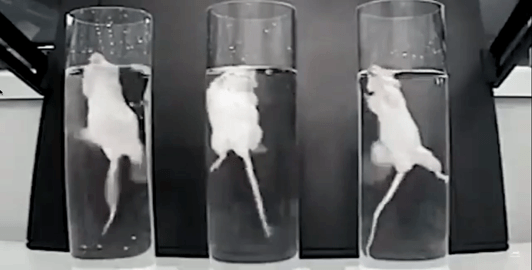UN INT Intro Text w/ Responsive Image - *Important Note* You must UNLINK this shared library component before making page-specific customizations.
For so many humans living with depression, the currently available treatments are inadequate. Sometimes they don’t work, or if they do, they bring with them unbearable side effects. Experts have claimed that archaic animal tests are a primary reason why antidepressant drugs fail more than 90% of the time before reaching the market.
This is why many of the world’s top pharmaceutical companies have banned one test in particular: the forced swim test. Following talks with PETA, Johnson & Johnson, Bayer, GlaxoSmithKline, AbbVie Inc., Roche, AstraZeneca, Novo Nordisk A/S, Boehringer Ingelheim, Pfizer, and Bristol Myers Squibb have all announced that they will no longer conduct or fund the forced swim test.

However, pharmaceutical giant Eli Lilly—whose products include Prozac, Cialis, Trulicity, and Humalog—clings defiantly to this bunk-science test that torments and kills animals, pretending that it’s somehow predictive of human depression. It is not, but the company has conducted it anyway, despite evidence that it’s no more predictive than a coin toss.
Let’s flex some free-market muscle and let Eli Lilly know it’s time to ban the torment of animals in the forced swim test.
Here’s how the test works: Experimenters often dose mice, rats, guinea pigs, hamsters, or gerbils with a test substance. Then they put the animals in inescapable containers of water. The panicked animals scramble to escape, trying to claw their way up the sides of the beakers or diving underwater in search of an exit. They paddle furiously, desperately trying to keep their heads above water. Eventually, they start to float.

That’s it. That’s what is somehow supposed to lend insight into human depression. But the forced swim test can mislead experimenters because it suggests that some drugs might be antidepressants when in reality they’re not (like caffeine), and it can overlook the real antidepressant potential of other drugs—meaning they sit on the shelf and never reach patients. It simply does not work, and it needlessly terrifies thousands of animals.
Even Eli Lilly’s blockbuster antidepressant, Prozac, hasn’t yielded consistent results from the forced swim test.
Please let the company know it’s time to join the 21st century and ban the tormenting of animals in bogus tests that help no one.
Please join our call if you use one of the following products, but do not stop taking your physician-prescribed medication:
- Alimta
- Basaglar
- Cialis
- Cymbalta
- Cyramza
- Emgality
- Erbitux
- Forteo
- Humalog
- Humulin
- Jardiance
- Olumiant
- Prozac
- Strattera
- Taltz
- Tradjenta
- Trulicity
- Verzenio
- Zyprexa
If you’re not an Eli Lilly customer, please take action here.